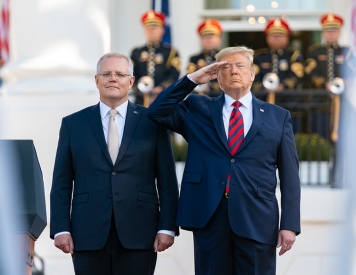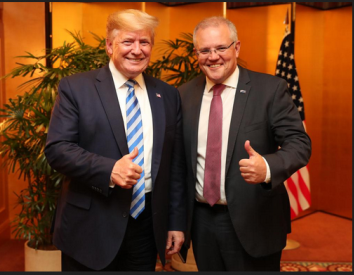Our servility to the United States is making Australia an international pariah, writes Kellie Tranter.
SOLELY TO strengthen its alliance with the U.S., Australia was the third country to sign on to the U.S. invasion of Iraq in 2003.
On 20 August this year – again following some feigned reluctance – the Morrison Government announced that Australia would be the third country to sign on to the U.S.-led International Maritime Security Construct (IMSC) in the Middle East. It cited the United Nations Convention of the Laws of the Sea and emphasised the need to ensure freedom of navigation and free flow of commerce.
Few believed our justification.
The UK’s Sir Michael Fallon observed that "You can always rely on Australia to step up" — which sounded like the prelude to our participation in the commission of a crime rather than a crusade for freedom.
The irony of our Prime Minister raising concerns about potential threats to our economy must not be lost on Iranians. Their economy has been deliberately eye-gouged courtesy of U.S.-imposed economic sanctions.
These have been described by Idriss Jazairy, the UN Special Rapporteur on effects of sanctions on human rights, as
‘violating human rights and the norms of international behaviour, with such action precipitating man-made humanitarian catastrophes of unprecedented proportions.’
On those issues Australia is silent.
In August 2018 Iran Ambassador Gholamali Khoshroo reportedly said:
For the first time in the history of the United Nations, the United Nations, the United States – a permanent member of the security council with veto power – is engaging in penalising nations across the entire world; not for violating a security council resolution, rather, for abiding by it...
The U.S. withdrawal from JCPOA and reimposition of its sanctions is a serious breach of its legal obligations under the United Nations Charter, which entails its international responsibility.
The international community must act in the face of this international intimidation and affront towards the international legal order.
On the issue of the U.S. withdrawal from the Iran nuclear deal in May 2018, Australia didn't mention the United Nations Charter's obligations.
With bland indifference, the media statement said simply:
Australia is disappointed that the United States has announced its withdrawal from the Joint Comprehensive Plan of Action (JCPOA) that places restrictions and limits on Iran’s nuclear program… The United States has also announced that it will impose new sanctions on Iran and any affected Australian businesses should seek legal advice to ensure they comply with all sanctions.
On 5 November 2018, Iranian doctors were warning about shortages of medicine that they need for treating their patients, as reported in The Guardian:
Ahmad Ghavideh, the head of Iran’s haemophilia society, said the lives of at least 12,000 patients with bleeding disorders in Iran will be put at immediate risk when the country’s supply of medicine runs out.
"We believe that sanctions are in fact worse than waging a classic war, because when you’re in the war situation at least civilian buildings, and targets are supposed to be spared, while with sanctions in this scale, a whole nation has been targeted,” he said.
Idriss Jazairy responded that
‘measures that seek to block a country’s trade altogether, amount to economic warfare against civilians, with devastating consequences.“Under economic sanctions, people also die but from lack of food and medicine, rather than from explosive devices.”'
Two days after Australia announced it would participate in the IMSC, Idriss Jazairy noted:
The reimposition of sanctions against Iran after the unilateral withdrawal of the United States from the Iran nuclear deal, which had been unanimously adopted by the Security Council with the support of the U.S. itself, lays bare the illegitimacy of this action.
This illegitimacy was confirmed by the opposition of all other permanent members of the Security Council and indeed of all international partners. The UN Charter calls for sanctions to be applied only by the UN Security Council precisely to ensure such wanton attacks on nations are avoided.
These unjust and harmful sanctions are destroying the economy and currency of Iran, driving millions of people into poverty and making imported goods unaffordable.
But when it comes to the economic devastation of Iran, Australia is silent. Just like our involvement in the Iraq war, dragging us into this conflict is a simple and spurious attempt by the United States to legitimise its illegitimate actions.
On 26 May 2019, co-director of the Center for Economic and Policy Research Mark Weisbrot noted:
... when Trump in May of 2018 announced that he’s going to reinstitute sanctions ... there was a lot of drop in anticipation. But, once again, you get a big drop in oil production and you had inflation of 51% in 2018. Since the sanctions have been implemented, the currency is down about more than 50% on the parallel market and that contributes a lot to the inflation. For 2019, the IMF has lowered [its] projection for economic growth for Iran from negative 3%, to negative 6% as a result of the sanctions and [it] can get a lot worse. And so, people are punished by this.
This is an attack on the civilian population and there are [sic] loss of income, and also, there are [sic] loss of access to medicines. So, for example – and there’s more studies of this than there are on the sanctions against Venezuela – but there was a 2016 study done by faculty at the University of California San Diego School of Medicine, and they found 73 drugs that were related to the specific disease burden of Iran, and there were shortages, and 44% of these were essential medicines according to the World Health Organisation. So, this is a very serious impact. Sanctions really are, these economic sanctions are really a form of warfare and they kill people, just like bombing does and other forms of conventional warfare.
On the one hand, Australia professes to strongly support the global norms and rules regarding freedom of navigation, particularly the UN Convention of the Law of the Sea — the free flow of commerce and defence of our interests wherever they may be under threat.
But on the other, it is silent on findings of international experts, such as that of the UN Special Rapporteur who carefully examined and concluded that
... unilateral measures are against the UN’s Declaration on the Principles of International Law concerning friendly relations and cooperation among States. The resolution, in accordance with the international body’s Charter, was adopted by the General Assembly on Oct. 1970, and it recalls 'the duty of States to refrain in their international relations from military, political, economic or any other form of coercion aimed against the political independence or territorial integrity of any State.'
On 28 August 2019, the deputy chair of Iran’s Foreign Relations Committee, Kamal Dehghani Firouzabadi, rightly pointed out that
"It was very surprising for me to hear that Australia joined the coalition because the United States is making repeated mistakes, including pulling out of the nuclear agreement ... Those who take part in this coalition are responsible for the damage caused by this coalition."
If Australia wants to send military personnel to patrol the Straits of Hormuz on the basis of protecting oil flow, our economy and our national interests, then it needs to be honest about how our actions are condoning and supporting the United States in its destruction of Iran’s economy.
Reports confirm that
Iran can't find buyers for its oil on the open market, just like it can't buy food or medicine on the open market. In effect, it is cut off from the U.S.-dominated international financial system. The U.S. is uniquely positioned to choke off imports and exports from a targeted country using sanctions with deep, negative consequences for that country’s economy, imposing severe constraints on its government’s ability to address economic problems.
Moreover, reports suggest:
‘U.S. sanctions mean that production of oil — a vital export — is in free fall, unemployment is on the rise, and record inflation due to scarce imports has made it harder for everyday Iranians to buy basic goods and access life-saving medicine. Recent reports have detailed harrowing stories of hospitals running out of crucial cancer medicines and patients struggling to afford or even find their prescriptions.
As in Venezuela and other targeted countries, U.S. sanctions undoubtedly have a human toll associated with them, which will only grow as time goes on. This human impact is one of the main reasons that experts in international law argue unilateral sanctions are illegal under the United Nations Charter and international human rights law.’
Once again, Australia is engaging in an international mission directed at Iran based on “potential threats” not based on any level of principle or any consistent application of international humanitarian law — nothing other than making the U.S. happy.
Subsequent to our decision to join the IMSC, we hear news of the detention of three Australians and of a President who maintains that the U.S. is "locked and loaded" with the gun pointed firming at Iran for the recent drone attacks on oil facilities in Saudi Arabia.
Even if the worst doesn’t eventuate, it doesn’t change the fundamental condition of our conscious choice to participate, namely in the collective punishment of the entire nation of Iran by our ally, even before a bomb is dropped.
Just how long can we sit by and watch Australia – once renowned as a principled state in the international order – become an international pariah through its servility to the United States?
Kellie Tranter is a lawyer and a human rights activist. You can follow her on Twitter @KellieTranter.
 This work is licensed under a Creative Commons Attribution-NonCommercial-NoDerivs 3.0 Australia License
This work is licensed under a Creative Commons Attribution-NonCommercial-NoDerivs 3.0 Australia License
Support independent journalism Subscribe to IA.












